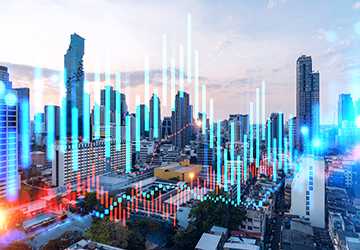The real estate industry, like many sectors, is in a constant state of evolution. As we approach the next chapter in property, a combination of technology, societal trends, and global dynamics are shaping what we can expect. Dive into the real estate predictions for the upcoming decade and explore what 2030 property trends might bring.
1.The Rise of Smart Homes and Connected Communities
Arguably one of the most significant future housing developments will be the continued emergence of smart homes. More than just a buzzword, homes in the next decade will be equipped with the latest technology, from energy management systems to voice-activated appliances. These smart homes will not operate in isolation. They will be part of connected communities, leveraging the Internet of Things (IoT) to provide seamless experiences for residents.
2.Sustainability Takes Center Stage
With the growing concerns about the environment, sustainable and green building practices will become the norm rather than the exception. Expect homes and buildings constructed with energy-efficient materials, solar panels, green roofs, and other eco-friendly amenities to dominate the 2030 property trends.

3.Urbanization and the Growth of Mixed-Use Developments
Cities will continue to grow, and with this growth, the need for housing will intensify. However, the way we think about urban living will shift. Mixed-use developments, where residential, commercial, and recreational spaces coexist, will proliferate. These multi-purpose spaces will cater to the live-work-play mantra of the modern urbanite.
4.The Role of Virtual Reality in Property Showcasing
Next-gen real estate insights suggest that Virtual Reality (VR) will play a pivotal role in property showcasing. Potential buyers or tenants will have the opportunity to take virtual tours, experiencing a property without physically being present. This technology will not only save time but also revolutionize the global real estate market, making it more accessible.
5.A More Personalized Buying Experience with AI
Artificial Intelligence (AI) will transform the property buying experience. Based on the preferences of buyers, AI will provide a curated list of potential properties. Think of it as a personalized property matchmaker. These real estate predictions showcase a future where house hunting becomes less of a chore and more of a tailored experience.
6.Affordable Housing Solutions Will Be Paramount
With the ever-growing global population and the increasing divide between the rich and the poor, providing affordable housing solutions will be a primary focus in the next decade. Modular homes, tiny homes, and co-living spaces are just some of the innovative solutions expected to address this challenge.
7.Reimagining Commercial Spaces
Remote work has altered our perception of office spaces. As a result, the future will witness a reimagining of commercial spaces. Flexible workspaces, collaborative areas, and facilities focused on well-being will become integral components of the office of the future. This shift is closely linked to 2030 property trends, where the blending of work and personal life becomes even more integrated.
8.Real Estate Investments Will Become More Globalized
As the world becomes more interconnected, the real estate market will increasingly become globalized. Investors will not just look within their localities or countries; they will seek opportunities worldwide. This global perspective will be facilitated by platforms and tools that provide next-gen real estate insights, giving investors the confidence to make informed decisions.
9.The Growing Importance of Community and Amenities
People are no longer just buying a house; they are buying into a community. The importance of communal spaces, amenities like gyms, parks, and recreational areas, will grow in significance. Developers will need to factor in these desires when conceptualizing new projects.

10.The Evolution of Real Estate Transactions
Blockchain technology and smart contracts are expected to play a significant role in future housing developments and transactions. These technologies will provide more secure, transparent, and efficient methods of conducting property transactions.
11. Embracing Decentralized Ownership through Tokenization
With the evolution of blockchain technology, one of the most intriguing future housing developments is the concept of property tokenization. Here's how it could change the landscape:
● Liquidity: Tokenizing real estate assets will make it easier to trade portions of a property, thus increasing liquidity in markets.
● Accessibility: Traditional barriers to real estate investments, like substantial capital requirements, could be bypassed. A broader audience could invest in lucrative properties worldwide.
● Transparency: Every transaction gets recorded on the blockchain, ensuring that property histories are tamper-proof and transparent.
12.Aging Populations and Real Estate Adaptations
One of the more pressing 2030 property trends concerns the aging global population. With more elderly citizens than ever before:
● Specialized Housing: There will be a surge in demand for homes adapted to seniors, like single-level houses and assisted living facilities.
● Location Preferences: Older populations might prefer locations closer to healthcare facilities, resulting in shifts in popular property locales.
● Community Models: Expect the rise of age-inclusive communities, integrating both younger and older residents in symbiotic environments.
13.The Integration of Biophilic Designs
Biophilic designs, which incorporate natural elements into modern architecture, will be a cornerstone in next-gen real estate insights:
● Mental Health: Such designs can promote better mental well-being, given the innate human connection to nature.
● Sustainability: They often include energy-saving measures, water conservation techniques, and promote a greener way of life.
● Increased Value: Properties with biophilic designs may fetch a premium due to their unique blend of nature and architecture.
14.The Role of Augmented Reality (AR) in Real Estate
Beyond VR, Augmented Reality (AR) will influence the property market:
● On-Site Visualization: Potential homeowners can visualize how unfurnished properties might look with their belongings using AR.
● Interactive Property Tours: AR can enhance property tours, offering instant information on fixtures, history, or potential modifications.
● Local Amenities: While touring a property, AR might provide live data on local schools, shopping centers, and more, enhancing the buyer's understanding of a locale.
15.The Shift to Experience-driven Real Estate
Future property owners might not just seek a home, but an experience:
● Themed Communities: From artist villages to tech hubs, specialized communities that cater to specific interests will rise in popularity.
● Enhanced Amenities: Beyond traditional amenities, properties may offer curated experiences like masterclasses, themed events, or communal activities.
● Holistic Living: Properties might integrate wellness centers, organic farms, and mental health facilities, emphasizing holistic well-being.
Conclusion,
The future of real estate is not just about buildings and land. It's about the confluence of technology, societal demands, and innovative solutions. As we journey into the next decade, these real estate predictions and next-gen real estate insights paint a picture of a dynamic, responsive, and transformative industry. It's an exciting time to be part of the property world, and only time will tell how these predictions unfold.





